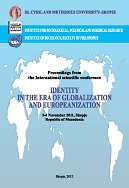Author(s): Jonuz Abdullai,Kujtim Ramadani / Language(s): English
Issue: 1/2012
In contemporary systems, there is a prevailing conscience that the society as a whole is dynamic and no static and that it undergoes permanent changes during its stages of development.
Within the course of these changes, the process of globalization emerged, through which economies, societies, cultures and even linguistic communities get integrated by means of communication, transport and trade.
Social, economic, and political bonds that surpass the borders among countries determinately condition the fate of all those living in those countries.
We will see that, according to many authors, such as A. Giddens, the globalization of social relations should be understood first of all as a system of time and space in our social lives. It is not a new process; contrariwise, it dates back some centuries ago when the impact of the west began to spread all over the world. The globalization process did not happen smoothly and unnoticeably – from the very beginning it was associated with inequality among different regions and countries in the world, by emphasizing the importance of the creation of societies in Third World countries.
Some of the challenges Europe has to face with include all the developed countries. The others
have to do with the European situation – especially with the elimination of soviet-type societies
in Eastern Europe. We should not think that the EU represents just a magnified version of what it actually was before 1989. With its borders open to the east, and consequently, to the south, the EU identity cannot remain unchanged.
The social identity changes depend on several factors, including the technological, economic, political and cultural ones.
Some authors, like Dominique Moïsi, say that Europe and the USA have been gripped by the fear “of the others” and by the fear of loss of identity and national interests. But, according to him, the world today has the greatest possibilities to be rebuilt on the grounds of the “clash of emotions”, unlike the ideas presented by Samuel Huntington according to whom we are living in a world divided by cultural diversities, national interests, and political ideologies.
We will also present parts of our scientific research called “students’ approaches and attitudes towards global and religious movements” carried out with students from the Southeast European University.
More...


